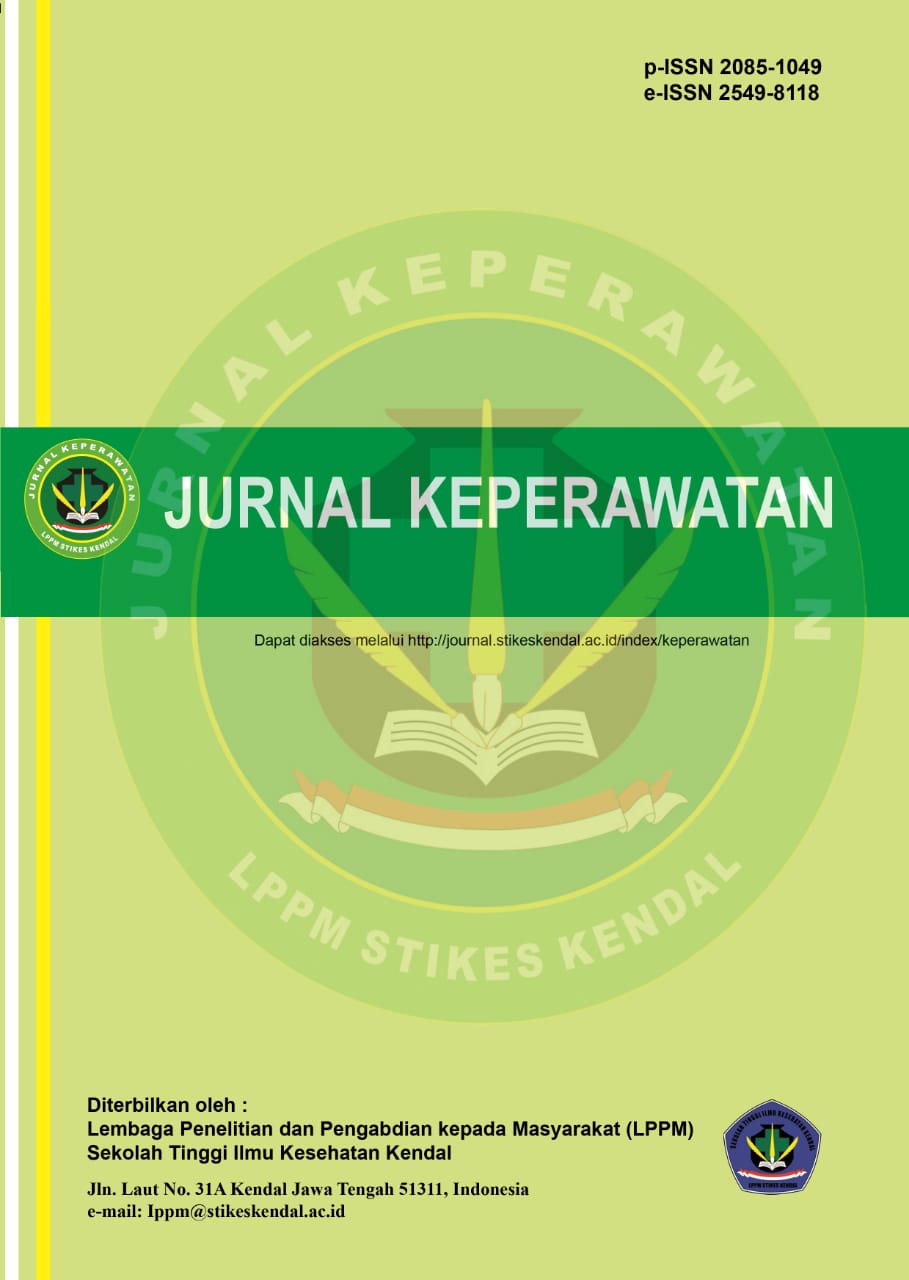Implementation of Structured Discharge Planning for Empowerment and Self Efficacy of Type II Diabetes Mellitus Patients
DOI:
https://doi.org/10.32583/keperawatan.v14iS1.76Keywords:
diabetes mellitus, empowerment, self efficacy, structured discharge planningAbstract
Self-efficacy is a person's belief to take action to achieve a desired goal with his abilities. The achievement of good Self Efficacy in Diabetes Mellitus patients is very dependent on the Discharge Planning provided by health workers. Discharge Planning is a process of assessing, preparing, and coordinating to facilitate the supervision of health services and services before and after returning home. Patients with type II diabetes mellitus who seek treatment in March - August 2021 at Hospital Mardi Waluyo Metro. The design in this study is a pre-experimental approach. The one group pretest-posttest design is an experimental research that uses only one group in principle and no control group using the Wilcoxon Signed Rank Test. Normality test using Shapiro-Wilk. The sampling technique in this study was purposive sampling with a sample size of 30 respondents. The results of the normality Shapiro-Wilk Test on Self Efficacy before and after being given a Discharge Planning Structured obtained p =0.740, (p <0.05), so the data is not normal. The results of the Wilcoxon Signed Rank Test obtained a p-value of 0.000 <0.05.it was concluded that there was an Implementation of Structured Discharge Planning for Empowerment and Self Efficacy on Diabetes Mellitus patients at Mardi Waluyo Metro Hospital in 2021.
References
Agency for Health Care Research and Quality. (2017). Strategy 4: Care Transitions From Hospital to Home: IDEAL Discharge Planning.
American Diabetes Association. (2020). Classification and diagnosis of diabetes: Standards of Medical Care in Diabetes-2020. Diabetes Care, 43(1), S14–S31. https://doi.org/10.2337/dc20-S002
Aryani, T. (2013). The Effect of Discharge Planning on Self-Efficacy in Heart Failure Patients at Raden Mattaher Hospital and RS. Haji Abdoel Madjid Batoe Jambi. University of Indonesia, 81–87.
Avisti, Y. (2013). The Relationship of Self-Efficacy with Learning Motivation of Al-Hasan Orphanage Jombang Children. Maulana Malik Ibrahim State Islamic University.
Baker, MS (2019). The Relationship between the Implementation of Discharge Planning and Patient Satisfaction in Class II and III Inpatient Rooms at Prof.Dr.WZ Johannes Kupang Hospital. Surabaya.
Brunner, & Suddarth. (2013). Textbook of Medical Surgical Nursing (8th ed.). Jakarta: EGC.
Deghan, H., A, C., & GM, K. (2017). General Self Efficacy and Diabetes Management Self Efficacy of Diabetic Patients Referred to Diabetes Clinic of Aq Qala, North Iran. Diabetes Metab Disord, 16(8). Retrieved from https://www.ncbi.nlm.nih.gov/pmc/articles/PMC5312542
Dzusturia, D. (2016). The Effect of Diabetes Self Management Education and Support (DSME/S) on Quality of Life in Type 2 Diabetes Mellitus Patients in the Work Area of the Patrang Health Center, Jember Regency. University of Jember.
Ghufron, MN, & Risnawita, R. (2017). Psychological Theories. Yogyakarta: Ar Ruzz Media.
International Diabetes Federation. (2019). IDF Diabetes Atlas, 9th edn. Brussels, Belgium. Retrieved March 17, 2021, from International Diabetes Federation website: https://www.diabetesatlas.org
Isnaini, N., & Ratnasari, R. (2018). Risk Factors Affecting the Incidence of Type Two Diabetes Mellitus. Journal of Midwifery and Nursing Aisyiyah, 14(1), 59–68. https://doi.org/10.31101/jkk.550
Kshanti, IAM, Wibudi, A., Sibaani, RP, Saraswati, MR, Dwipayana, IMP, Mahmudji, HA, … Pase, MA (2019). Guidelines for Independent Blood Glucose Monitoring. In Indonesian Endocrinology Association. Retrieved from https://pbperkeni.or.id/wp-content/uploads/2019/12/Pedoman-Pengelolaan-Glucose-Darah-Mandiri-2019.pdf
Munir, NW, Munir, NF, & Syahrul, S. (2019 ). Self-Efficacy and Quality of Life of Type 2 Diabetes Mellitus Patients. Journal of Health Research “SUARA FORIKES” (Journal of Health Research “Forikes Voice”), 11(2), 146. https://doi.org/10.33846/sf11208
Pramono, AP (2018). Analysis of Compliance Factors for Fulfilling Nutritional Needs in Clients with Diabetes Mellitus Based on Health Belief Model Theory. Surabaya.
Rahman, HF, Y, Y., & L, S. (2017). Self-Efficacy, Compliance, and Quality of Life of Type 2 DM Patients. E-Jurnal of Health Library, 5(1). Retrieved from https://jurnal.unej.ac.id/index.php/JPK/article/view/4059
Riskesdas. (2018). Riskesdas Profile of Lampung Province in 2018. Retrieved from dinkes.lampungprov.go.id
Rosya, E., Sesrianty, V., Kairani, A. (2015). Discharge Planning (Discharge Planning) in the Hospital. In CV. Pena Persada (Vol. 62).
Sa'adah, N. (2016). The Relationship of Self-Efficacy Beliefs on Foot Care Behavior in Diabetes Mellitus Patients. UMY.
Sasmiyanto. (2019). Relationship of Health Behavior with Blood Sugar Levels and Quality of Life in Diabetes Patients. Journal of Primary Health, 108(2), 114–123. Retrieved from http://jurnal.poltekeskupang.ac.id/index.php/jkp/article/view/349
Sihotang, LG (2015). Effect of Structured Discharge Planning on Self Efficacy of Ischemic Stroke Patients at Santa Elisabeth Hospital Medan. University of North Sumatra, Medan.
Smeltzer, SC (2013). Brunner & Suddarth Medical Surgical Nursing. Jakarta: EGC.
Trisnawati, S., & Setyorogo, S. (2013). Risk Factors for Type 2 Diabetes Mellitus in Puskesmas Cengkareng, West Jakarta in 2012. Scientific Journal of Health, 5(11), 6–11.
Usman. (2017). The Effect of Discharge Planning on Knowledge of Nutrition Management in Type II Diabetes Mellitus Patients in Toto Kabila Hospital, Bone Bolango Regency. Retrieved from http://siat.ung.ac.id/files/wisuda/2017-1-1-14201-841412026-abstrak-26072017023248.pdf
Downloads
Published
How to Cite
Issue
Section
License
Copyright (c) 2022 Jurnal Keperawatan

This work is licensed under a Creative Commons Attribution-NonCommercial-NoDerivatives 4.0 International License.




